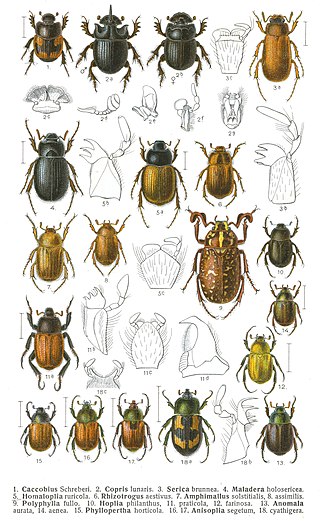
The family Scarabaeidae, as currently defined, consists of over 35,000 species of beetles worldwide; they are often called scarabs or scarab beetles. The classification of this family has undergone significant change. Several groups formerly treated as subfamilies have been elevated to family rank, and some reduced to lower ranks. The subfamilies listed in this article are in accordance with those in Catalog of Life (2023).

Paracotalpa puncticollis is a beetle of the family Scarabaeidae. Commonly referred to as the Punctate Little Bear, they range from California to New Mexico. It is usually found in piñon-juniper ecosystems where it feeds on juniper leaves. Little research has been published on the species, with the last journal article being published in 1972. P. puncticollis biology is poorly understood, but it appears to be active between February and May, with peak activity occurring in April.
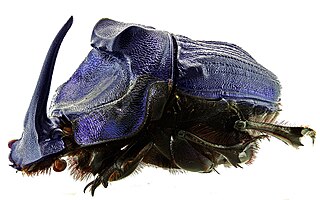
Coprophanaeus is a genus in the family Scarabaeidae. The genus is almost entirely Neotropical, with a single species, C. pluto, ranging into southernmost Texas in the United States. They are medium-sized to large beetles, with the South American C. ensifer and C. lancifer sometimes exceeding 5 cm (2 in) in length, making these two some of the largest dung beetles in the world and the largest in the Americas. They often have a horn on the head, and are typically a bright metallic color, most often blue or green, or black. These diurnal or crepuscular beetles are excellent diggers and good fliers.

Onthophagus is a genus of dung beetles in the Onthophagini tribe of the wider scarab beetle family, Scarabaeidae. It is the most species-rich and widespread genus in the subfamily Scarabaeinae, with a global distribution.

Digitonthophagus gazella is a species of scarab beetle. It belongs to the genus Digitonthophagus, which was promoted from subgenus to genus level in 1959. There has been some confusion regarding the application of the names with many people using the outdated name Onthophagus gazella. Dung beetle experts use the term Digitonthophagus gazella.

The western Hercules beetle is a species of rhinoceros beetle that lives in Arizona, New Mexico and Utah in the United States and in parts of northern Mexico. This species is known for its grayish-white elytra, large size, and characteristic horn of the adult males.
Apotrepus densicollis is a species of true weevil in the beetle family Curculionidae and is found in North America. Adults are associated with dead saguaro.
Onthophagus orpheus is a species of dung beetle in the family Scarabaeidae. It is found primarily in the eastern United States and southeastern Canada.
Lyreus is a genus of cylindrical bark beetles in the family Zopheridae. There are at least three described species in Lyreus.
Photuris fairchildi is a species of firefly in the beetle family Lampyridae. It is found in North America.This species is known to use aggressive mimicry in order to lure in and prey upon the males of other species of fireflies. This species inhabits marshes, spruce forests, and other low-lying swampy areas.
Acmaeoderopsis rockefelleri is a species of metallic wood-boring beetle in the family Buprestidae. It is found in Central America and North America. It lives on Acacia constricta and Prosopia juliflora.

Onthophagus nuchicornis is a species of dung beetle in the family Scarabaeidae. It is found in Europe and North America. Though Onthophagus nuchicornis is listed as "Vulnerable" in the United Kingdom, it is a common and abundant species in North America. It has been used as a model organism for ecotoxicological studies of ivermectin, where different biological endpoints are stimulated at low levels of ivermectin exposure, but impaired at high levels of ivermectin exposure.

Ora texana, the Texas flea marsh beetle, is a species of marsh beetle in the family Scirtidae. It is found from Virginia to Texas in the United States south to Costa Rica.
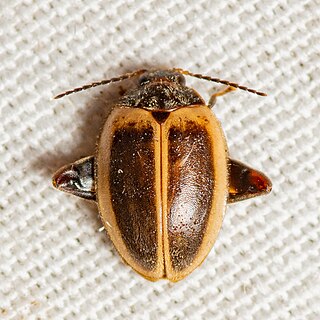
Ora discoidea is a species of marsh beetle in the family Scirtidae. It is found in Central America and North America from Texas to Florida.
Ora troberti is a species of marsh beetle in the family Scirtidae. It is found in Florida and Texas in the United States south through Central America.
Ora hyacintha is a species of marsh beetle in the family Scirtidae. It is only known to occur in Florida.
Holotrichia rufoflava is a species of dung beetle found in South India and Sri Lanka.

Caccobius unicornis, is a species of dung beetle found in many Asian and South East Asian countries such as: India, Sri Lanka, China, Java, Borneo, Taiwan, Korea, Japan, Myanmar, North Vietnam, Philippines, Sumatra, Java, Borneo, Malaysia, Thailand, and Indochina.
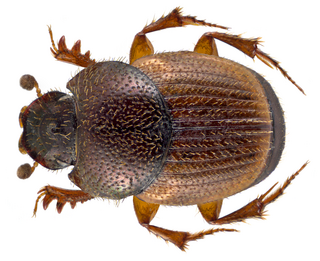
Onthophagus centricornis is a species of dung beetle found in India, Sri Lanka and Afghanistan. It is a small arboreal dung beetle inhabited in both dry and wet forests.
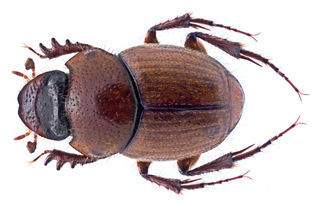
Onthophagus ochreatus, is a species of dung beetle found in India, and Sri Lanka.










